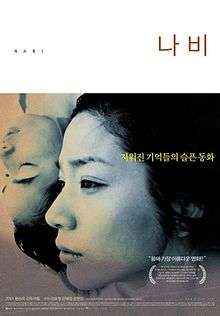Farjad Nabi
Farjad Nabi (Urdu: فرجاد نبی) is a Pakistani film producer, director, cinematographer and documentary maker. He rose to prominence in 1999, when his film No One Believes the Professor won the best film at the Kathmandu International Mountain Film Festival. He is best known for co-directing the 2013 Pakistani film Zinda Bhaag, which earned him international recognition and accolades including, along with Meenu Gaur, the ARY Film Award for Best Director at the 1st ARY Film Awards.
Personal life
Farjad was born to Muslim parents in 1969 in Lahore, Pakistan.
Work and career
Nabi is a Lahore-based director who has directed award-winning documentaries including Nusrat has Left the Building… But When? and No One Believes the Professor. He has also documented the work of Lahore film industry's last poster artist in The Final Touch. Nabi has produced and presented a musical documentary on interior Sindh called Aaj ka Beejal for BBCUrdu. Since then he has been recording the dying breed of gallivants (story singers) in the Lahore region. His Punjabi stage plays Annhi Chunni di Tikki (Bread of Chaff & Husk) and Jeebho Jani di Kahani (The Story of Jeebho Jani) has been recently staged and published. He is presently working on a documentary film and monograph along with Meenu Gaur on the Lahore film industry also known as Lollywood.
Nabi
Nabi may refer to:
- Nabi (film), a 2001 South Korean film
- The Korean language title of Mr. Butterfly, a 2003 South Korean film
- Typhoon Nabi, a 2005 super typhoon
- Nabi is also the name of a Korean input method for UNIX platforms
- Nabi: The Prototype, a manhwa by Yeon-Joo Kim
- Nabi, name of the cat, a primary character, in the Korean animation, There She Is!!

Nabi (film)
Nabi (나비, literally "Butterfly") is a 2001 South Korean film. Directed by Moon Seung-wook, Nabi was shot on digital video and transferred onto 35mm film, filmed on a low budget of $380,000. It marked the feature film debut of Kang Hye-jung, who won Best Actress at the 5th Puchon International Fantastic Film Festival for her role as Yuki. Nabi also starred Kim Ho-jung, who won the Bronze Leopard for Best Actress at the 54th Locarno International Film Festival.
The film is a science fiction tale set in a near future Korea, where an "oblivion virus" which causes memory loss has become the centre of a tourist industry aimed at those who wish to forget the past. Anna Kim, a German woman of Korean descent, seeks the virus in order to erase painful memories and, along the way, develops a close bond with her driver and her teenage guide.
Plot
The film is set in an unnamed Korean city of the near future, a city plagued with acid rain, lead poisoning, and the "oblivion virus". People come from all over the world on guided tours of the city deliberately seeking the virus. Victims of lead poisoning are quarantined in sanatoriums for the protection of tourists, and forced abortions are carried out to prevent the births of deformed babies.

Universal Sufism
Universal Sufism is a universalist spiritual movement founded by Inayat Khan while traveling throughout the West between 1910 and 1926, based on unity of all people and religions and the presence of spiritual guidance in all people, places and things.
Orders and leadership
Inayat Khan died in 1927. Leadership of the Sufi Movement he had founded first passed to his brother, Shaikh-ul-Mashaikh Maheboob Khan; in 1948 to his cousin, Pir-o-Murshid Ali Khan; in 1956 to his youngest brother, Pir-o-Murshid Musharaff Khan; and in 1968 to his grandson, Pir-o-Murshid Fazal Inayat-Khan. In the 1980s Murshid Fazal proposed a bifurcation between Sufi Movement and the Sufi Way, which became a specific branch of Inayat Khan’s lineage founded by Murshid Fazal in 1985. For an in-depth description of this history written by Murshid Fazal – read “Western Sufism: The Sufi Movement, The Sufi Order International, and The Sufi Way”. In 1988 Fazal's father Hidayat Inayat Khan became Pir-o-Murshid of the International Sufi Movement. Following the death in 1990 of Murshid Fazal, he was succeeded by the first woman leader of the tariqah (path), Pirani Sitara Brutnell. She died in 2004, naming Pir Elias Amidon as her successor.
Podcasts:

